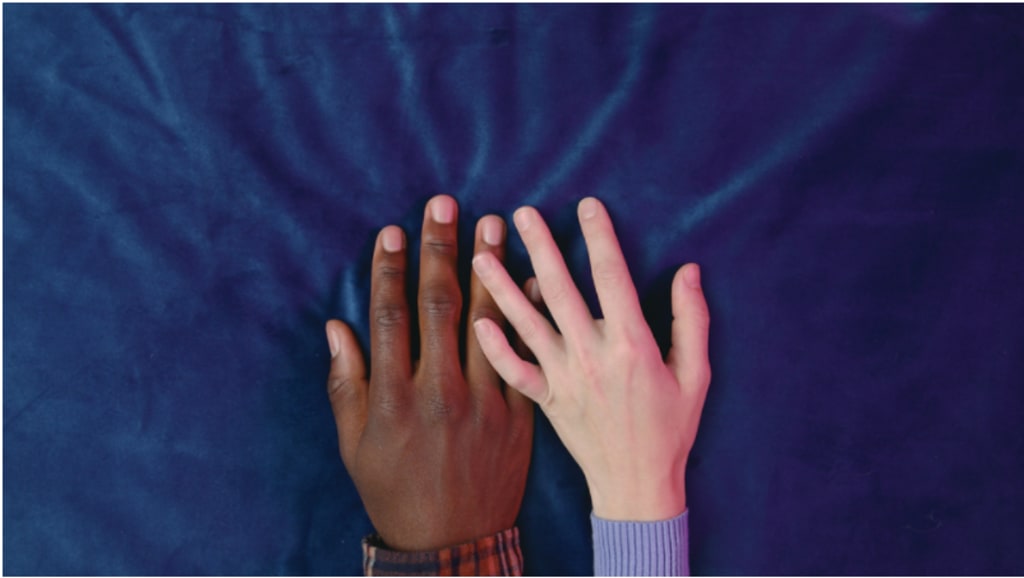
Netflix's new miniseries The Principles of Pleasure, which premiered on Tuesday, is a pleasant and lively pastel-colored examination of women's sexuality, complete with vulva diagrams and sex toy demonstrations, as well as explanations of menstrual cycles and masturbation. However, there is one issue that is a little more difficult to answer: why do we still have to do this? Why is it so difficult for women who sleep with men to get sexual pleasure while avoiding suffering and harm, despite living in a society that is more sexually open than ever before?
The statistics on heterosexual women's sexual enjoyment are generally depressing. Nearly a third of women and 7% of men said they had pain during vaginal intercourse, with the majority of them indicating they didn't tell their partners about it. While orgasm is far from the only form of sexual pleasure, it is estimated that 10% to 15% of women have never had it. There's also the unidentified number of women who think they're having orgasms but aren't. (Given that only approximately 1% of persons identify as asexual, many an orgasmic woman may be dissatisfied with their status.) The orgasm chasm resembles a canyon: Straight women were the least likely among lesbian, gay, bisexual, and heterosexual adults to orgasm during sex, according to a 2016 survey of more than 50,000 Americans. Then, in order to find that illusive pleasure, many women must deliberately endeavor to avoid discomfort and danger, such as men choking, slapping, spitting, gagging, or removing condoms mid-coitus.
"I would say the most popular question is surprisingly pretty much the same between the elementary, high school, and collegiate," explains sex educator Ericka Hart in The Principles of Pleasure. Christine Emba, a Washington Post columnist, released her new book, Rethinking Sex, on the same day as the series. She talks about meeting a woman who told her about a budding relationship with a gentleman she liked but who had a propensity of choking her during sex, which she didn't like. "I mean, what do you think?" the woman inquired of Emba. Is sex intended to hurt? is a variant on the same subject.
The Principles of Pleasure provides easy-to-apply answers. It encourages us to become more aware of our bodies, interacts with our partners, and experiment with audio-erotica. Women who are unable to enjoy sex because of their body dissatisfaction are encouraged to stand in front of the mirror every day and identify aspects of their bodies that they enjoy. The series' narrator recommends, "The road to healing begins with self-love."
WHY DO WOMEN WHO SLEEP WITH MEN FIND IT SO DIFFICULT TO ACCESS SEXUAL PLEASURE AND AVOID PAIN AND HARM, EVEN IN A SOCIETY THAT IS IN SOME WAYS MORE SEXUALLY OPEN THAN EVER BEFORE?
We could all benefit from a little more affection for our bodies. However, the continual exhortations to self-love and communication suggest that it is women's failing, not society's fault, that keeps so many of us from experiencing sexual pleasure. It's part of a trend called "confidence culture" by researchers Shani Orgad and Rosalind Gill, in which women are encouraged to take responsibility for systemic societal issues by following (often friendly, usually motivational) instructions to improve our self-esteem, sex lives, and careers by becoming more self-confident and assertive.
Few problems that are so widely shared can be solved by individual solutions, and a slew of recent books written by women have addressed the flaws of contemporary sex culture, from Emba's new release to Amia Srinivasan's The Right to Sex and Katherine Angel's Tomorrow Sex Will Be Good Again, both UK academics. Nona Willis Aronowitz's Bad Sex: Truth, Pleasure and an Unfinished Revolution is on the horizon, and it asks, "What, exactly, do I want? And, given the horrors and lures of patriarchy, capitalism, and white supremacy, are my sexual and romantic desires even possible?" (Willis Aronowitz is the daughter of Ellen Willis, a writer who was one of the early pioneers of the idea of sex-positive feminism in the early 1980s.)
The limits of the #MeToo era's understandable focus on consent have become a running theme among writers attempting to diagnose our sexual ills. It's an important legal foundation, but focusing exclusively on whether or not a sexual experience was assault might allow for all kinds of horrible sex that was formally consented to but nonetheless caused bodily or emotional harm. Angel contends that consent culture, like confidence culture, places the onus on individual women to not only learn to love their bodies but also to thoroughly investigate their wants in order to be certain of what they want or don't want before engaging in sex. "The weight of appropriate sexual connection is placed on women's actions by consent and its illusion of total clarity," she writes. "Woe to the woman who does not know herself and does not speak her wisdom." Any harm that occurs in strictly consensual experiences can be ignored; after all, she agreed to it.
"We're permitted to do anything we want if everyone involved is happy to be there and free to leave whenever they want," one sex guru explains in Principles of Pleasure. It's a common phrase, and according to Srinivasan, it sounds a lot like "capitalist free exchange norms." Should our actions be held to no higher ethical standard than the sexual marketplace's unseen hand?
Emba's book, titled "A Provocation," is prescriptive in nature, arguing that people are more likely to be hurt by the sex they do have than by the sex they forego, and that a world dedicated to avoiding unpleasant sex may be a world with less sex overall. The fact that we're already having less sex than previous generations and don't seem to mind isn't completely addressed. She also tries to gloss over the fact that the shift away from purity culture has benefited innumerable LGBT+ persons, not just women. ("Casual sex, in particular, harms women," she argues, as if women were sexually disadvantaged before hookup culture.) Despite this, the central premise of her book—that we may owe sexual partners more than current popular conventions suggest—rings true.
"The question shouldn't just be, 'Did I avoid rapping this person?'—that's the floor, not the ceiling," she contends. Perhaps love should have a role, but not in the romantic and candlelight sense. She instead uses Thomas Aquinas' definition of the term: "desiring the good of the other." It's yet another individual response to a systemic issue, but it has the advantage of turning outward, to our communities and the larger world, rather than the inward-focused dictums of self-help. It would also require anything of straight guys, unlike most of the commandments to love ourselves and our bodies.
Women's sexual safety and pleasure have frequently been promised as a result of a larger shift—the contraception revolution, sex positivity, and liberation from the nuclear family, to name a few. After decades of cries for change, it appears that the lousy sex problem will not go away once any other milestone of development is met. It's "dangerous to expect certain sorts of conduct would vanish 'after the revolution,'" as Willis phrased it. Women's sexual happiness is unlikely to be a joyful byproduct of cultural change; rather, it will have to be pursued as a goal in and of itself.
About the Creator
Rashel
Rashel is an investigative journalist for Time, The Atlantic and other magazines.






Comments
There are no comments for this story
Be the first to respond and start the conversation.